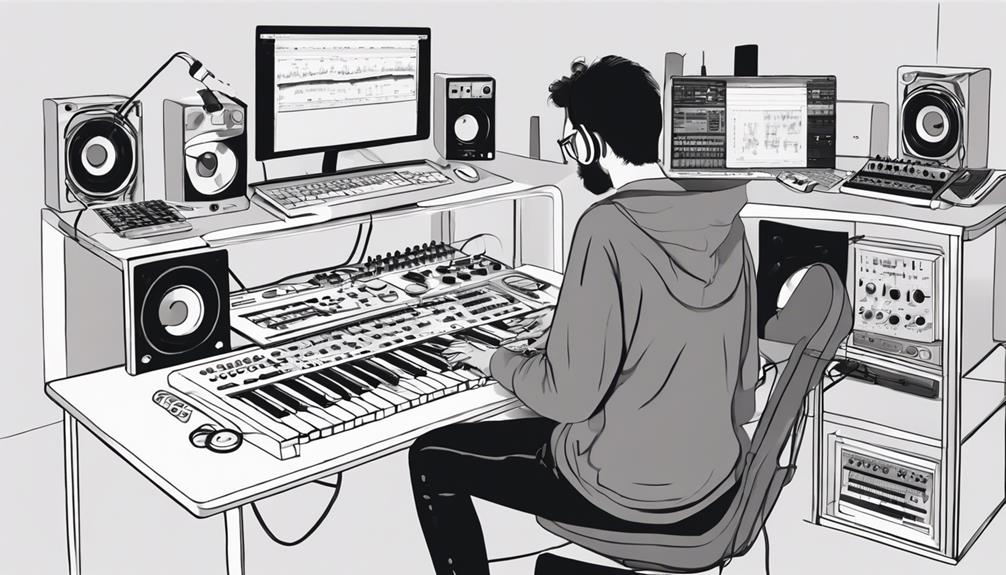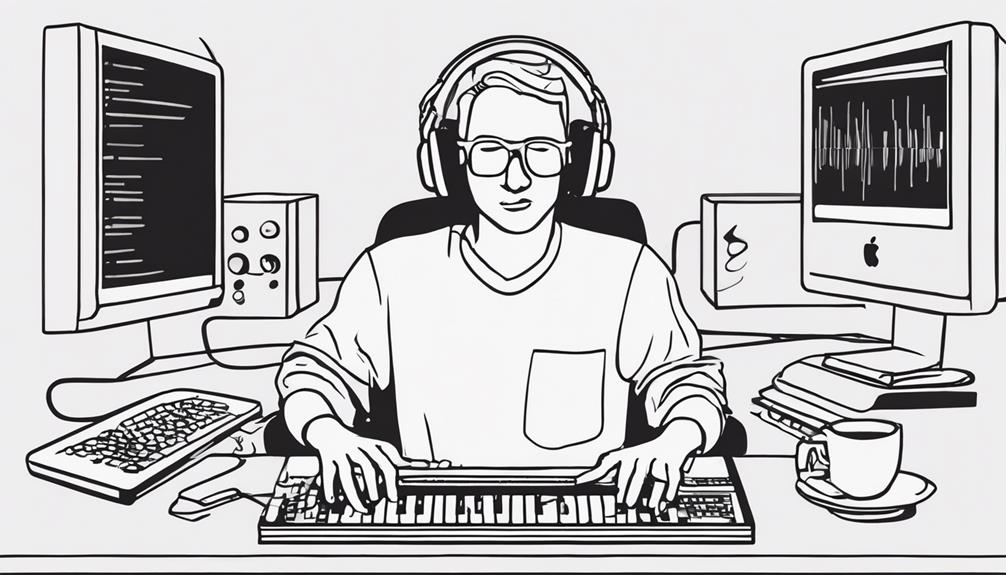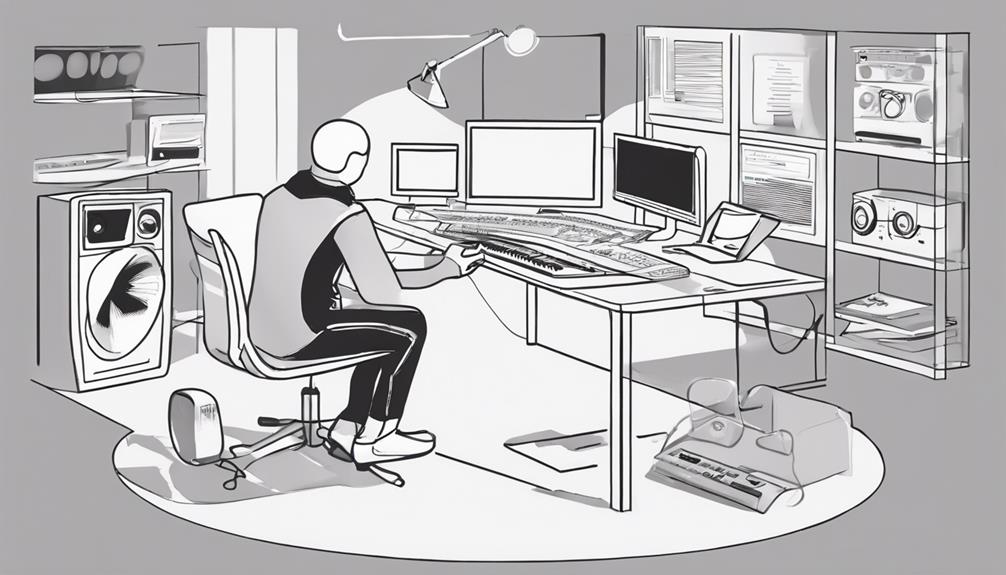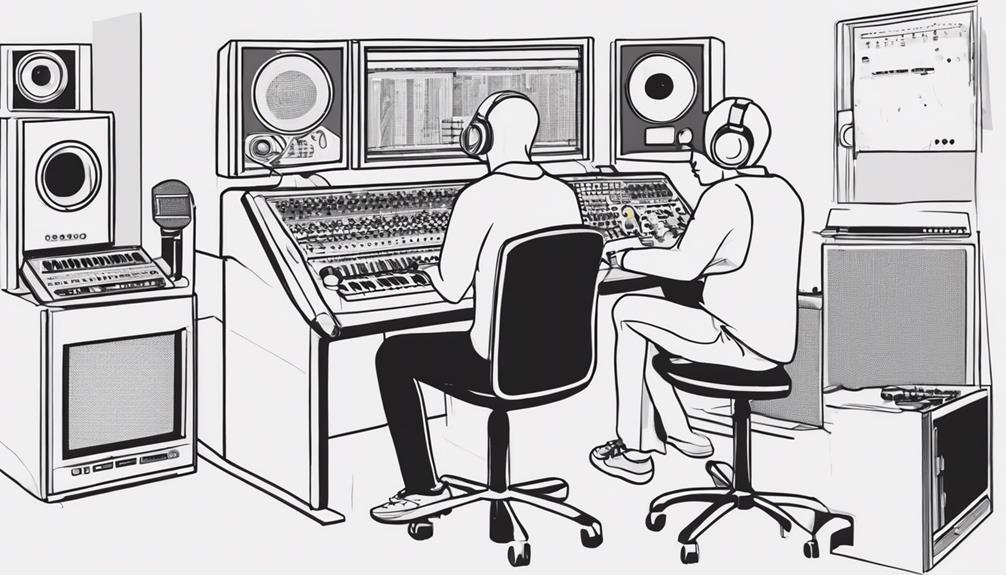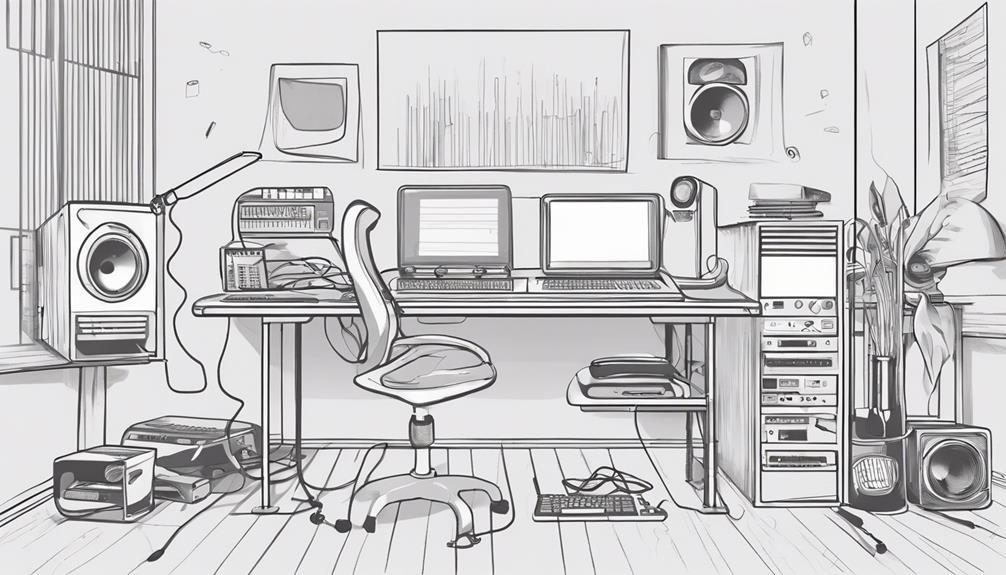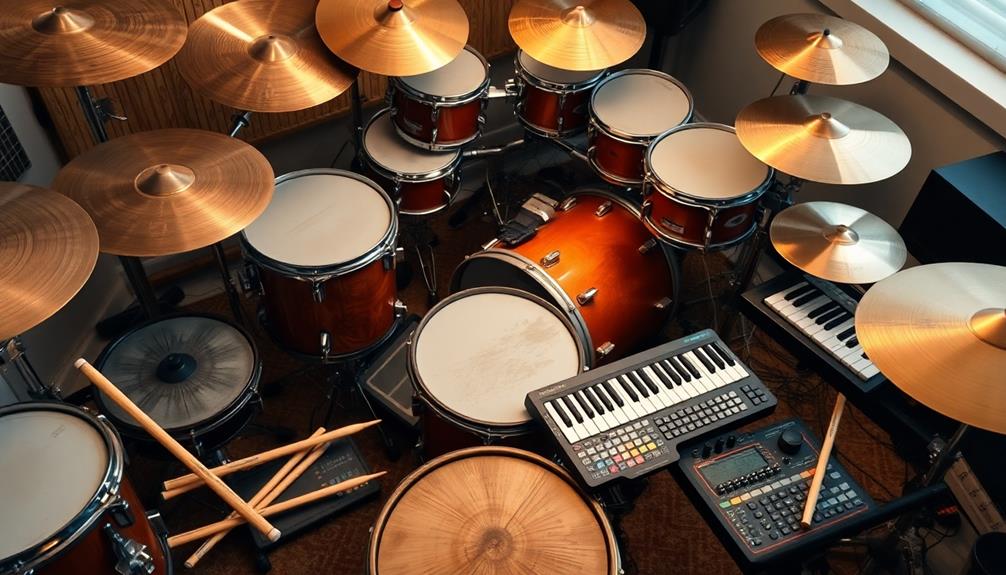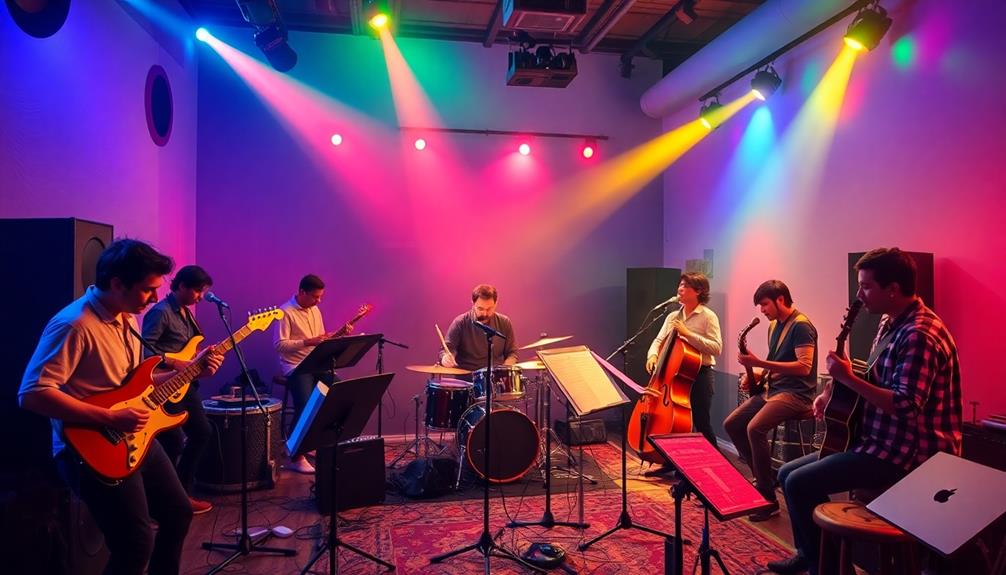Ready to start learning electronic music production? Begin by getting essential gear like a computer and studio monitors. Choose a Digital Audio Workstation (DAW) like Ableton Live or FL Studio. Build your sound library with samples and plugins from Splice and Native Instruments. Learn track structure, composition, and sound design techniques. Experiment with mixing effects like compression and reverb. Analyze reference tracks for inspiration. Engage in online music communities for collaboration and feedback. Take the first step today, and there's a whole world of electronic music production waiting for you! Start learning music production by dedicating time to practice and refining your skills every day. Explore online tutorials, courses, and resources to deepen your understanding of advanced techniques. Remember, consistency and creativity are key to transforming your ideas into polished tracks that resonate with listeners.
Key Takeaways
- Invest in essential equipment like a computer, DAW, and MIDI controller.
- Choose a DAW like Ableton Live or FL Studio for music production.
- Explore sample libraries and plugins for diverse sounds.
- Study track structure, composition, and sound design techniques.
- Engage in online communities for collaboration and learning opportunities.
Essential Musical Equipment
To begin your journey into electronic music production, acquiring essential musical equipment is paramount. Key items include a computer for running software, studio monitors or headphones for accurate sound representation, a sound card for high-quality audio processing, a MIDI controller for hands-on manipulation of virtual instruments and effects, and a MIDI keyboard to enhance musical input and creativity.
The sound card plays an essential role in accurately perceiving and producing audio, ensuring that your music sounds as intended.
MIDI controllers offer a tactile approach to interacting with your software instruments and effects, providing a more intuitive and dynamic production experience.
Additionally, studio monitors or quality speakers are necessary for monitoring your sound accurately, allowing you to make informed decisions during the production process.
Having a MIDI keyboard can further enhance your musical capabilities by offering a more natural and expressive way to input melodies, chords, and rhythms into your compositions.
Acquiring these essentials will set a solid foundation for your electronic music production journey.
Choosing a Digital Audio Workstation (DAW)
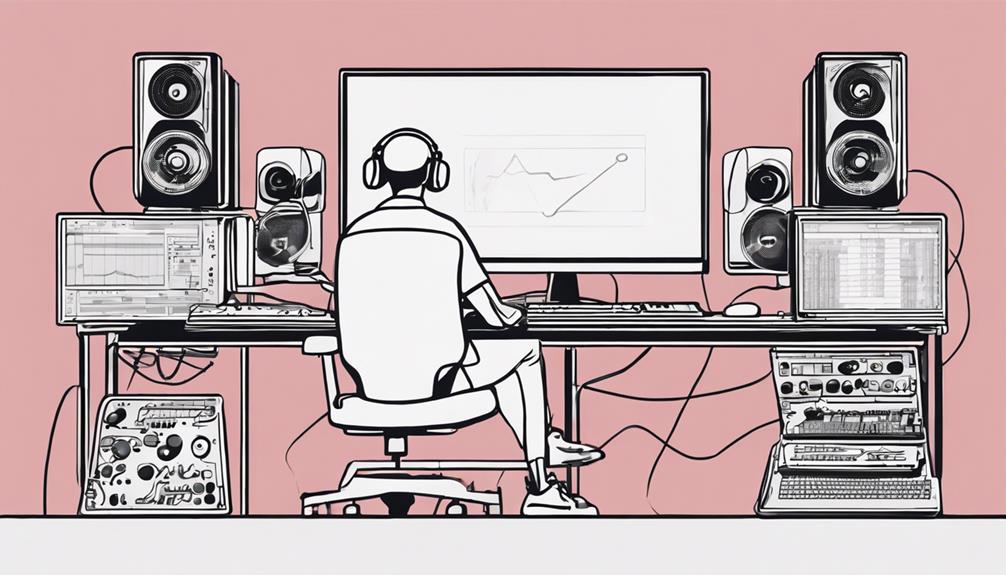
When venturing into electronic music production, your choice of a Digital Audio Workstation (DAW) plays a significant role in shaping your creative process and final output.
Popular DAW options like Ableton Live, FL Studio, Logic Pro, and Pro Tools offer diverse functionalities and user interfaces to cater to different production styles.
It's important to evaluate features such as MIDI capabilities for sequencing, audio recording/editing tools for refining your sound, built-in instruments for creating melodies, and compatibility with third-party plugins to expand your sonic possibilities.
To make an informed decision, consider factors like pricing options, trial versions, and user reviews that align with your budget and production requirements.
Additionally, exploring tutorials and online resources specific to your chosen DAW can provide valuable insights for mastering its functions.
Focus on understanding the workflow, shortcuts, and customization options within your selected DAW to streamline your music production process efficiently.
Samples and Plugins for Production
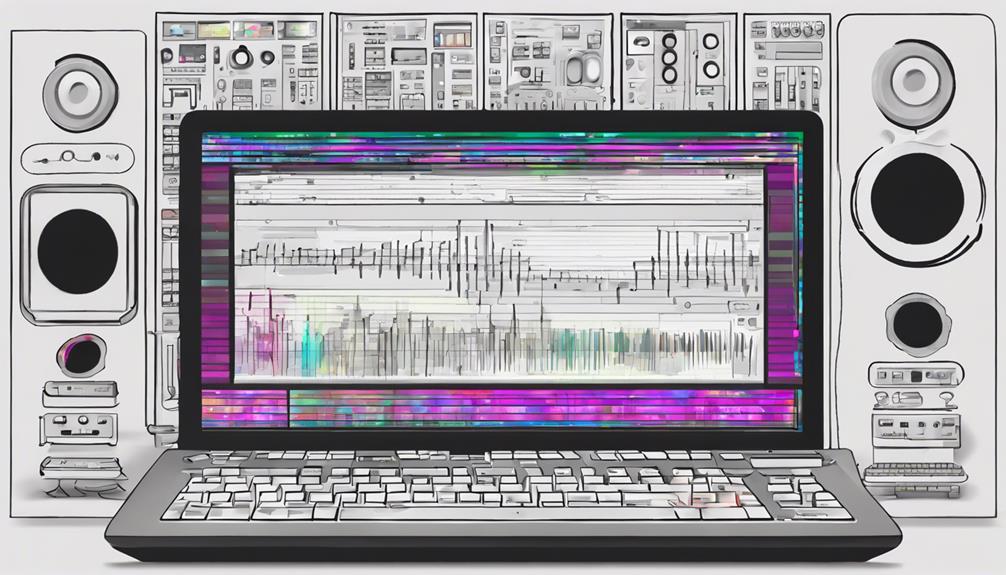
When it comes to electronic music production, samples and plugins are your go-to tools for creating unique sounds and enhancing your tracks.
Essential sound libraries provide a wide range of pre-recorded snippets to spark your creativity, while versatile virtual instruments offer endless possibilities for shaping your music.
Essential Sound Libraries
Explore online sources for a diverse selection of samples and plugins to enhance your electronic music production sound library. Samples are crucial for creating beats, melodies, and textures, while plugins add virtual instruments, effects, and processing tools to elevate your music. Utilizing third-party plugins can provide unique sounds and effects that go beyond what your Digital Audio Workstation (DAW) offers. Building a comprehensive collection of samples and plugins is essential for electronic music production, enabling you to unleash your creativity, experiment with different sounds, and achieve professional-quality results.
| Type of Library | Description | Examples |
|---|---|---|
| Sample Libraries | Collections of pre-recorded sounds used to create music | Splice, Loopmasters, Cymatics |
| Plugin Libraries | Software tools that add virtual instruments and effects to your DAW | Native Instruments, Waves, Serum |
| Online Sources | Platforms where you can purchase or download samples and plugins | Plugin Boutique, ADSR Sounds, LANDR |
Versatile Virtual Instruments
Expand your electronic music production toolkit with versatile virtual instruments, including a diverse array of samples and plugins for creating unique sounds and textures.
Samples are pre-recorded sound bits that provide depth and variety to your tracks, while plugins offer virtual instruments and effects to boost your creativity.
Third-party plugins offer a wide range of options for instruments and effects, enabling you to experiment and personalize your sound.
Utilizing online sources for samples and plugins can greatly broaden your options, giving you access to a vast selection of sounds to incorporate into your music.
Learning to effectively use samples and plugins is essential for electronic music production, as they play a pivotal role in defining the overall sound and style of your tracks.
Understanding Track Structure and Composition
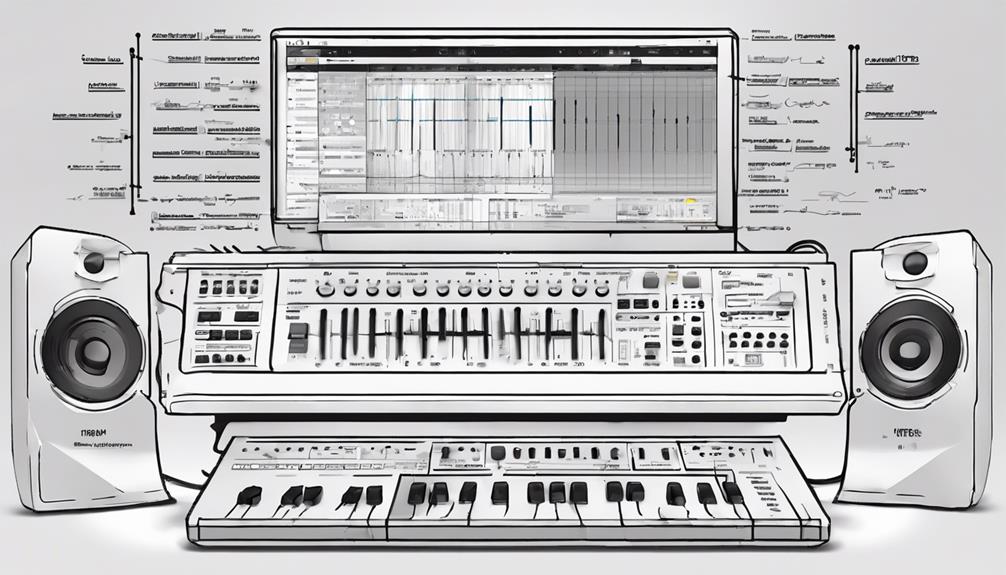
Delving into the intricacies of electronic music production, grasp the significance of track structure and composition to craft compelling and engaging pieces. When constructing electronic music tracks, it's essential to understand the various sections that make up the composition. Check out the table below to get a better understanding:
| Section | Description | Purpose |
|---|---|---|
| Intro | Sets the tone and introduces elements like melodies or rhythms. | Captures attention and builds anticipation. |
| Verse | Establishes the main theme of the track. | Develops the narrative and musical ideas. |
| Riser/Build | Builds tension and energy towards the climax of the composition. | Creates anticipation and excitement. |
| Chorus/Drop | Features the main hook or melody with increased energy. | Delivers the most impactful part of the track. |
| Solo | Showcases a specific instrument or melody, often with improvisation. | Adds variation and highlights musical skill. |
Understanding these sections, progressions, and importance is key to maintaining listener engagement and creating a memorable electronic music composition.
Importance of Sound Design
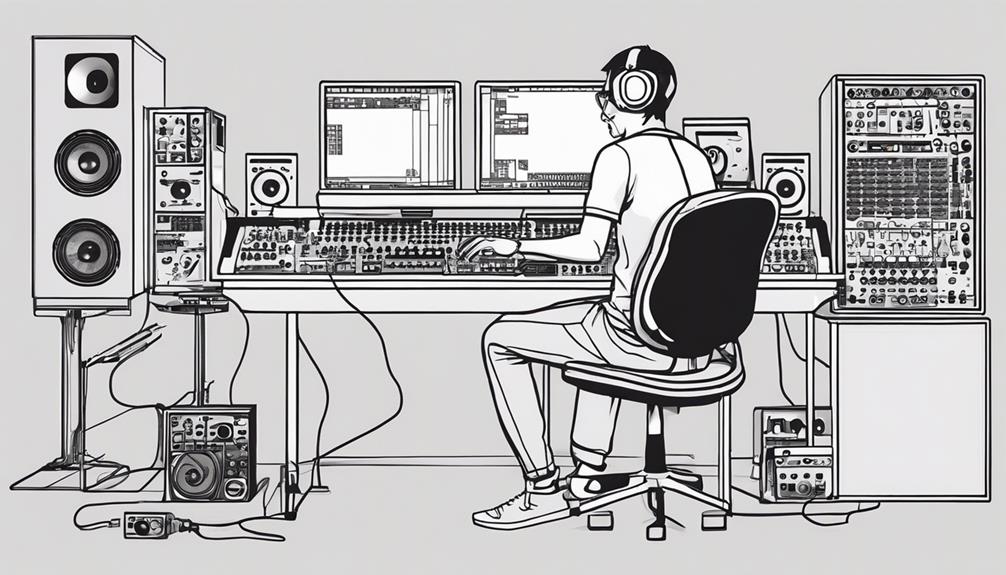
To elevate your electronic music compositions and captivate your audience, understanding the importance of sound design is essential. Sound design is a fundamental aspect of electronic music production, allowing you to craft unique and engaging sounds that enhance your tracks.
Here are some key points to keep in mind:
- Synthesis Techniques: Familiarize yourself with various synthesis techniques such as subtractive, additive, and FM synthesis to create diverse and original sounds for your music.
- Experimentation with Effects and Processing: Explore different effects and processing methods to manipulate sound and add depth to your tracks, leading to innovative results in sound design.
- Defining Mood and Signature Sound: Sound design plays a vital role in setting the mood, atmosphere, and overall character of your electronic music compositions. Mastering sound design tools and techniques can help you develop a signature sound that sets your music apart in the electronic music landscape.
Understanding these aspects of sound design can greatly enhance the quality and impact of your electronic music productions.
Mastering the Mixing Process
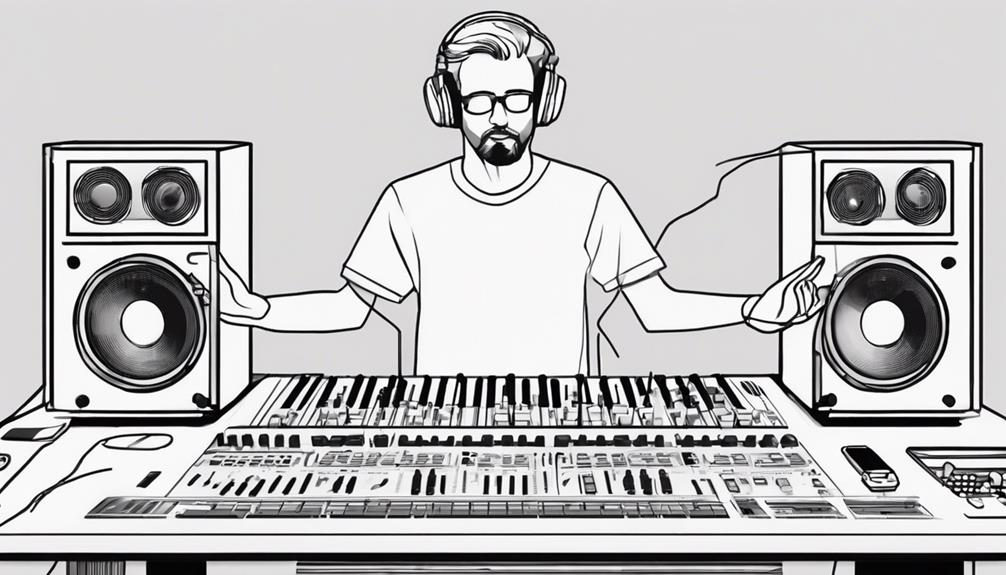
Understanding how to master the mixing process is essential for achieving professional-sounding electronic music productions. In the mixing process, it's important to balance levels, adjust panning, apply EQ effectively, and use various effects like compression, reverb, and delay strategically. These elements play a significant role in shaping the overall sound of your track. Additionally, paying attention to the stereo field can help create a wide and immersive listening experience for your audience. Utilizing reference tracks is also essential as it allows you to compare your mix with professionally produced tracks, helping you identify areas for improvement. Enhancing your critical listening skills will enable you to pinpoint and address any issues in your mix efficiently.
| Mixing Process | |
|---|---|
| Compression | Use to control dynamics and add punch to your tracks. |
| Reverb | Create depth and space in your mix, enhancing the sense of realism. |
| Delay | Add texture and movement to your sounds, creating interesting rhythmic patterns. |
| Effects | Experiment with different effects like chorus, flanger, and phaser to add uniqueness to your mix. |
| Reference Tracks | Compare your mix with professional tracks to improve the quality of your production. |
| Stereo Field | Pay attention to the stereo image to create a wide and immersive sound experience. |
Learning Through Reference Tracks
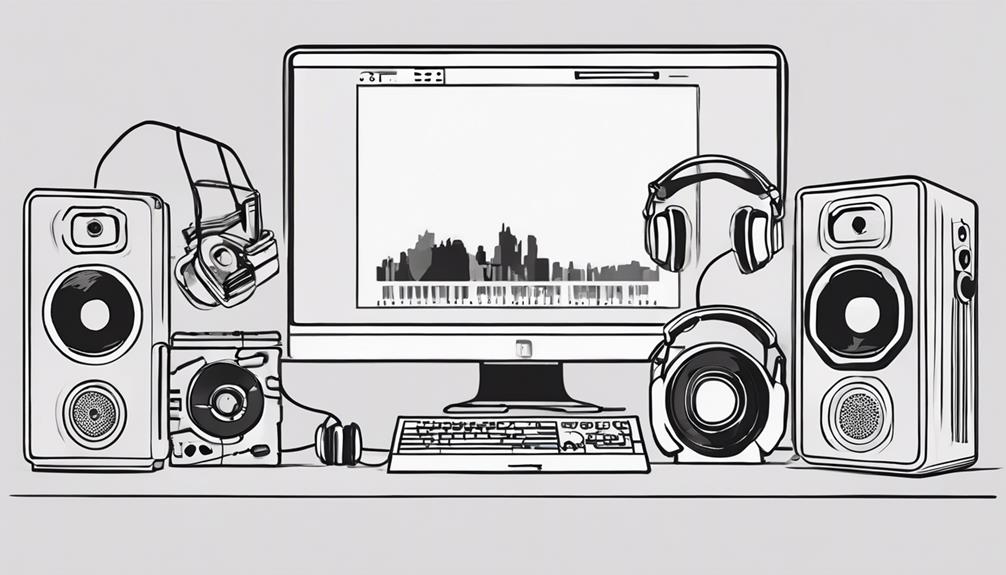
To enhance your understanding of electronic music production, consider learning through reference tracks in your chosen genre.
- Analyze reference tracks to grasp song structure, arrangement, and sound design elements.
- Take note of the effects, changes, and dynamics used in reference tracks to improve your own production techniques.
- Focus on the mixdown and mastering quality of reference tracks to elevate the final sound of your music.
Engaging With Online Communities
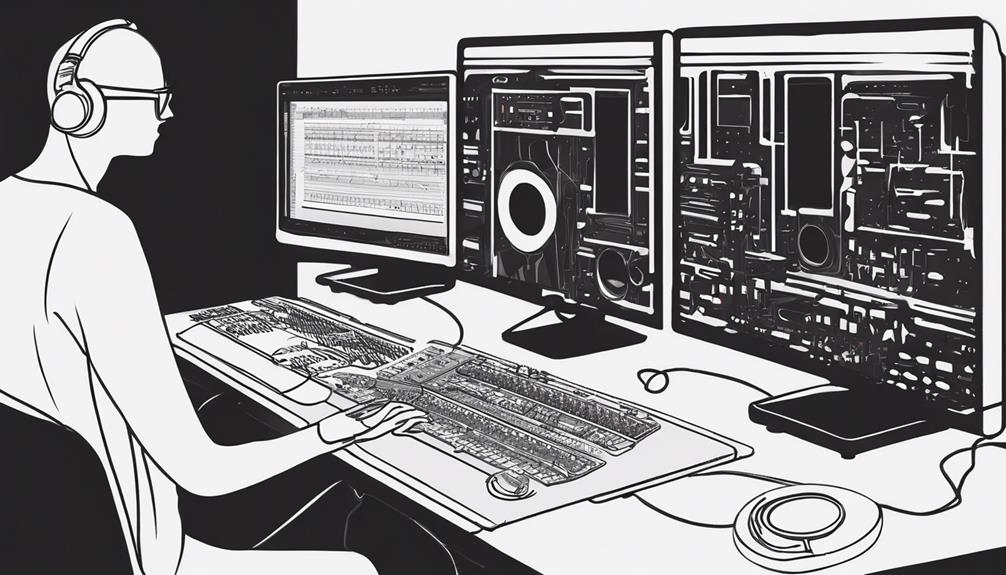
When looking to expand your electronic music production knowledge, engaging with online communities is key. Joining forums like Reddit's r/edmproduction or connecting on social media can offer networking opportunities and a space to collaborate with fellow producers.
Online Forum Participation
Engage with online forums like Reddit, Discord, and Facebook groups to connect with a community of electronic music producers, share knowledge, and collaborate on projects for valuable feedback and support. Online forums provide a platform where you can immerse yourself in discussions, seek advice on production techniques, and stay informed about industry trends.
Here's how you can make the most of your participation:
- Share your experiences and music projects to receive constructive feedback from fellow producers.
- Collaborate with others on projects to enhance your skills and gain new perspectives on music production.
- Join specialized forums tailored to specific genres or aspects of electronic music production for targeted insights and networking opportunities.
Social Media Connections
Connect with online communities dedicated to electronic music production on platforms like Reddit, Discord, and Facebook groups to expand your network and receive valuable feedback and support. Engaging with these online communities allows you to connect with like-minded individuals who share your passion for electronic music production. By sharing your knowledge, experiences, and music, you can receive constructive criticism and feedback to help you improve your skills.
Joining Facebook groups focused on electronic music production not only keeps you updated on industry trends but also provides a platform to connect with fellow producers and potentially collaborate on projects. Participating in online forums enables you to ask questions, share tips, and collaborate with a diverse global community of producers, fostering a supportive environment for growth and learning.
Additionally, following electronic music production influencers and experts on social media platforms like Instagram and Twitter can offer valuable insights and inspiration to keep you informed about the latest industry trends and techniques.
Collaborating With Other Producers
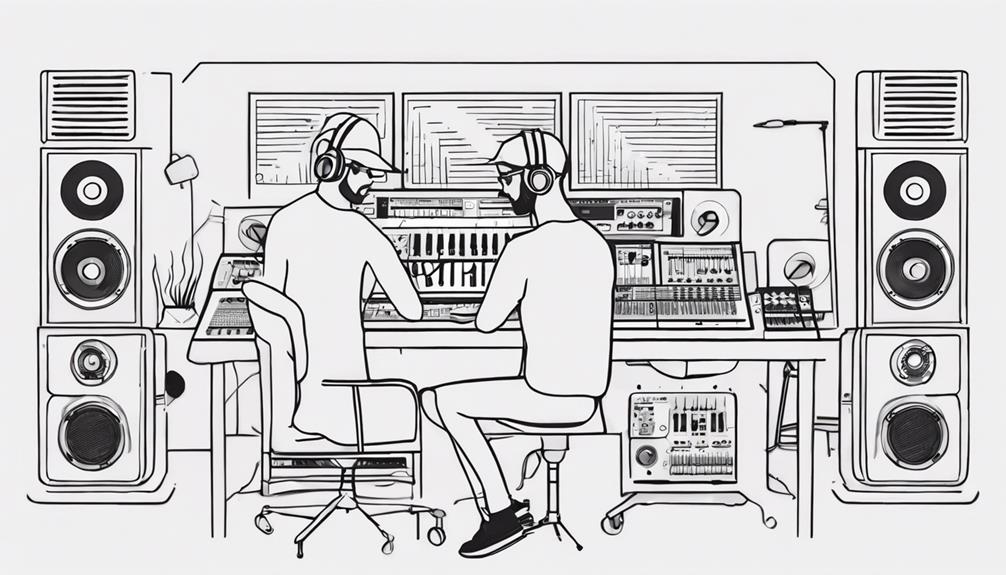
Collaborating with fellow producers in electronic music can greatly enrich your creative process and broaden your musical horizons. By working with other producers, you open yourself up to a world of possibilities and growth opportunities.
Here are a few key benefits of collaborating with other music producers:
- Mutual Learning Experiences: Engaging in collaborations allows for the exchange of knowledge, techniques, and insights, fostering a culture of shared learning and growth.
- Feedback Exchange: Working with other producers enables you to receive constructive feedback, identify areas for improvement, and refine your music production skills.
- Exploration of Different Genres: Collaborative efforts can lead to the exploration of diverse music genres, styles, and innovative production techniques, expanding your creative repertoire and pushing boundaries in your music production journey.
Embrace the power of collaboration to propel your electronic music production skills to new heights and cultivate a supportive network of like-minded individuals.
Frequently Asked Questions
How to Start Learning Electronic Music?
To start learning electronic music, choose a DAW and explore music theory basics. Experiment with samples and plugins. Watch tutorials to learn sound design and mixing. Practice regularly, seek feedback, and collaborate to improve your skills.
How Long Does It Take to Learn Electronic Music Production?
Learning electronic music production varies based on your dedication and methods. You could start creating basic tracks in weeks, but mastering advanced techniques might take years. Consistent practice, feedback, and structured learning paths can speed up the process.
Where Do I Start Learning to Produce Music?
Start by choosing a Digital Audio Workstation (DAW) like Ableton Live, FL Studio, or Logic Pro X. Explore tutorials on platforms like YouTube, Udemy, and Skillshare. Learn music theory basics and experiment with genres to find your sound.
How I Taught Myself Music Production?
You taught yourself music production by immersing in online tutorials and courses. Experimenting with software and plugins deepened your understanding. Connecting with fellow producers in forums provided feedback. Learning from pros in workshops and seeking mentorship refined your skills.
Conclusion
So, now you know the basics of electronic music production! Get ready to immerse yourself in a world of endless creativity and innovation.
With the right tools and knowledge, you'll be crafting masterful tracks in no time. Remember, the possibilities are endless, so don't be afraid to experiment and push your boundaries.
Start your journey today and watch your music production skills soar to new heights!

